Personalities & Impressions in Canadian Politics
December 22, 2016
In our final survey of the year, we asked Canadians to give us their impressions of a wide range of people who are or were involved in Canadian politics, from Prime Ministers, to Premiers and some of the leading names in the Conservative Party. Here are the highlights of what we found:
PRIME MINISTERS
• Of the five prime ministers (Mulroney, Chretien, Trudeau Sr., Harper, Trudeau Jr.) we polled on, Justin Trudeau enjoys, by a wide margin, the most positive set of impressions, followed by his father. Stephen Harper encounters the highest negatives.
• Mr. Harper’s image (28% positive, 52% negative) is virtually the mirror opposite of his successor, Justin Trudeau (52% positive, 29% negative).
• All five of the prime ministers we measured had very similar levels of negative opinion (24%-29%), with the exception of Mr. Harper (52%).

PROVINCIAL PREMIERS
• Of the five provincial premiers we polled on (Ontario, Quebec, BC, Alberta, Saskatchewan) Kathleen Wynne is the best known and has the highest negatives, on a national basis.
• Positive feeling about the premiers ranges from just 9% to 14%, and negative opinion ranges from 10% to 34%. Roughly half of those polled had no opinion about four of the five tested.
• Within their provinces, only Brad Wall enjoys more positive (57%-26%) than negative opinion. The worst results are for Premier Wynne (11% positive, 67% negative)
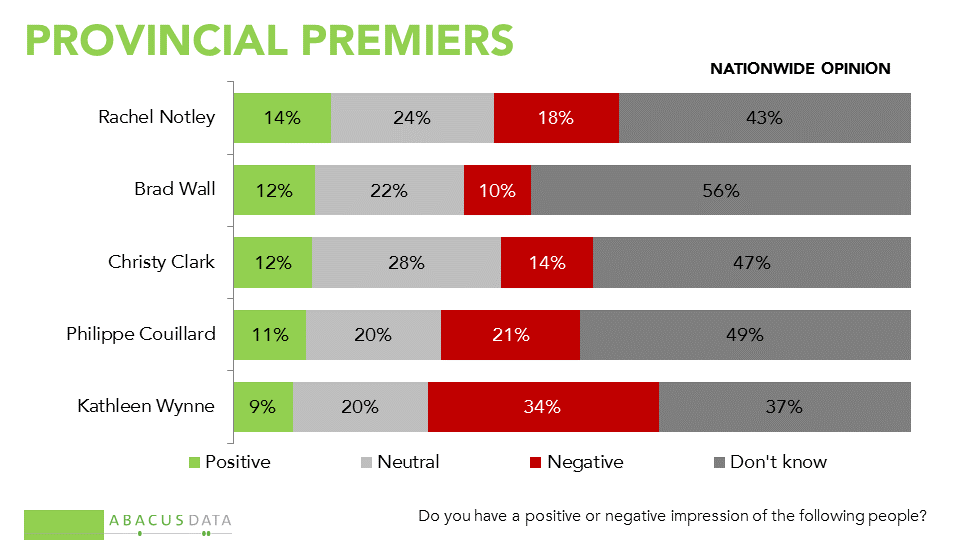
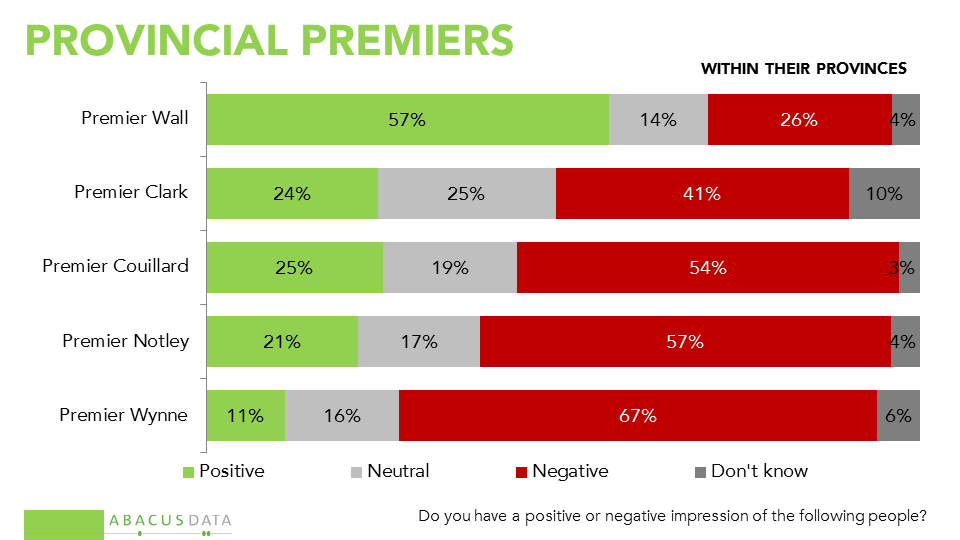
Because the premiers and the Prime Minister are meeting on different topics lately, it may be useful to look at the standing of the Prime Minister compared to a premier within each respective province.
In Ontario, Mr. Trudeau is 39-points more popular than Ms. Wynne. In BC, Mr. Trudeau is 32-points more popular than Ms. Clark. In Quebec, Mr. Trudeau is 23-points more popular than Mr. Couillard. In Alberta, Mr. Trudeau is 13-points more popular than Ms. Notley. In Saskatchewan, Mr. Wall is 21-points more popular than Mr. Trudeau.
CONSERVATIVE LEADERSHIP FIGURES
• Of the seven leading Conservatives that we polled on, Rona Ambrose and Kevin O’Leary top the list in terms of being known and well thought of. In terms of popularity, both trail Justin Trudeau by very wide margins.
• Andrew Scheer is the least well known, with 71% saying they have no opinion about him, and another 18% saying their opinion is neutral.
• Kevin O’Leary’s negatives are higher than those of Maxime Bernier, Kellie Leitch, Lisa Raitt, Michael Chong and Andrew Scheer.
• Across the country, 6% have a positive view of Kellie Leitch, while 17% have a negative opinion. This is the weakest positive/negative balance of any of the candidates we tested.
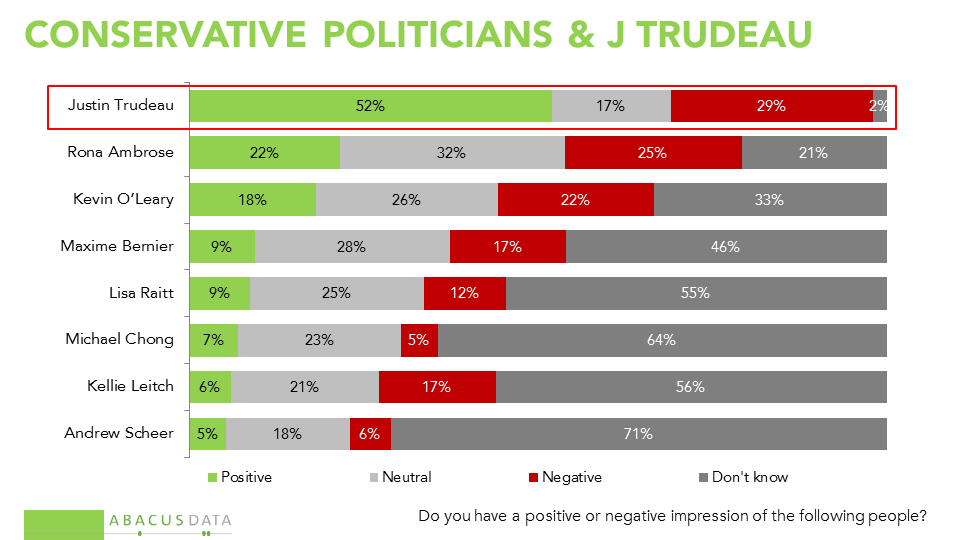
• Among Conservatives, 58% have a positive view of Rona Ambrose, followed by 35% for Kevin O’Leary, Lisa Raitt (19%), and Max Bernier (17%).
• Among Conservatives, only one of the names tested finds more negative than positive views: Kellie Leitch (10% positive, 15% negative).

• Among winnable Conservative voters (those who don’t currently support the CPC but are open to voting for them), Justin Trudeau is far more popular than any of the leading Conservative figures we tested. 55% of winnable Conservative voters have a positive impression of the Prime Minister compared to 21% who have a negative impression.
• Rona Ambrose and Kevin O’Leary are better known than the some of the current CPC leadership candidates we tested but O’Leary appears to have about as much potential to repel as attract support from this critical audience. Among winnable Conservative voters, only one of the names tested is clearly a net negative at this point: Kellie Leitch (7% positive, 12% negative).

Below are charts with all the political figures we tested in order from most positive and in order of most negative.
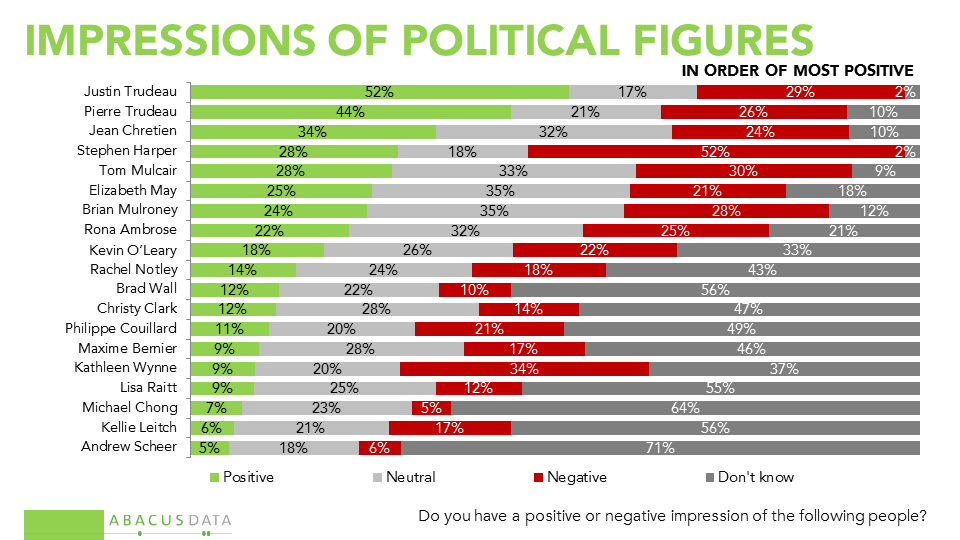
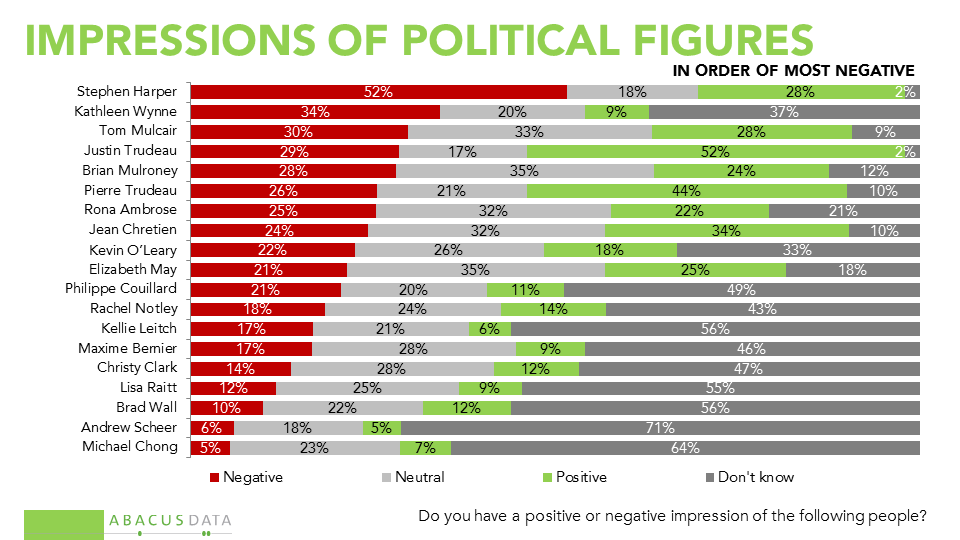
UPSHOT
According to Bruce Anderson:
“For years it’s been fashionable in the media to speculate that voters hate politicians – but the truth is less dramatic. Few politicians are loved, but few are truly disliked by large numbers of people. Within that general context, the current popularity of Justin Trudeau does stand out, as does the level of residual negative feeling towards Stephen Harper, and in Ontario towards Kathleen Wynne.
The current standing of Brian Mulroney proves that time erodes some of the antagonism that can build up towards incumbents – his numbers when he left office were quite a bit worse than they are today.
Among the Conservative names tested the two most disruptive voices Kevin O’Leary and Kellie Leitch land differently. O’Leary’s fame and blunt talk can pull some voters and repel others. So far, the numbers we see for Kellie Leitch suggest very limited pull – and considerably more potential to repel accessible Conservative voters.“
According to David Coletto:
“Justin Trudeau is the most popular politician in the country right now. Half of Canadians have a positive impression of him, almost double that of the next current political figure that we tested (Tom Mulcair at 28%). Nationally, he is well ahead of any provincial premier, party leader, or potential party leader.
Even at the provincial level, Mr. Trudeau is far more popular than all but one provincial premier we tested – Brad Wall in Saskatchewan. Most premiers are facing a First Minister across the table who is more popular than they are in their own province, a challenge in terms of negotiating leverage.
For the Conservative Party, the data indicates that all of the current leadership candidates are unknown to most Canadians. Expect for Maxime Bernie and Kellie Leitch, who are more defined to Canadians, others like Lisa Raitt, Michael Chong, and Andrew Scheer are very much blank slates. Even among those who have heard of them, there’s little definition either positive or negative.
Kevin O’Leary looms large as the one potential candidate who has high name recognition and relatively positive impressions. While more Canadians have a negative rather than positive impressions of Mr. O’Leary, he is particularly well known and liked among those who voted Conservative. Perhaps indicative of his potential appeal of Conservative members.
In the end, whoever ends up winning the Conservative leadership, they will be up against a very popular Prime Minister, who right now, is quite appealing to the very voters the Conservatives need to convert – those open to voting Conservative but who don’t support the party now.”
METHODOLOGY
Our survey was conducted online with 1,848 Canadians aged 18 and over from December 12 to 14, 2016. A random sample of panelists was invited to complete the survey from a large representative panel of over 500,000 Canadians.
The Marketing Research and Intelligence Association policy limits statements about margins of sampling error for most online surveys. The margin of error for a comparable probability-based random sample of 1,848 is +/- 2.3%, 19 times out of 20.
The data were weighted according to census data to ensure that the sample matched Canada’s population according to age, gender, educational attainment, and region. Totals may not add up to 100 due to rounding.
ABACUS DATA INC.
We offer global research capacity with a strong focus on customer service, attention to detail and value-added insight. Our team combines the experience of our Chairman Bruce Anderson, one of Canada’s leading research executives for two decades, with the energy, creativity and research expertise of CEO David Coletto, Ph.D.





